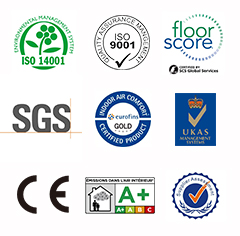Vinyl Flooring Vs. Hardwood: What’s The Difference?
Vinyl Flooring Vs. Hardwood: What’s The Difference?
Are you looking for excellent flooring material for your home? Vinyl and hardwood should top your list of options. But you still have to choose one of them. In this article, we are providing several differences between vinyl and hardwood.
1. Material
The main raw material for the production of vinyl flooring is PVC. PVC is a renewable resource. This material has been widely used in people's daily life, such as tableware and infusion tube bags. On the contrary, hardwood floors are made of natural trees in the forest.
2、Aesthetics And Appearance
Since the hardwood floor is made of natural trees, it has beautiful natural tones. The most important thing is that no pattern on a board is repeated. Vinyl flooring can imitate the appearance of hardwood floor, tile floor, stone floor, and it is more flexible. The pattern of vinyl flooring will have a certain repetitiveness, but this is a negligible problem.

3、Cost
The cost of vinyl flooring is much lower than that of solid wood, including glue down vinyl flooring. Including installation, vinyl flooring prices range from $2 to $7 per square foot. It all depends on where you buy yours from, plus the size you need. Although market demand influences prices, many exotic wood-look styles cost the same as other plank designs because vinyl flooring can be printed to look like virtually any wood species.
Buying and installing hardwood flooring is more expensive than vinyl flooring. Wood varies on price because the harder the hardwood is the more money it costs. With installation included, wood prices range from $8 to $15 per square foot for products like oak or maple, whereas more exotic woods like mahogany or teak could cost $25 per square foot or more. And, if hardwood isn’t pre-finished, then expect labor costs to increase. The exact cost depends on factors such as the type of wood that makes the flooring, its brand, and the store you visit.
Vinyl flooring doesn’t require any nails, adhesives, and vapor barriers. You could even install the floor without the help of an expert. This makes it a cost-effective option for homeowners who wish to spend as little as possible on the flooring installation process.
Take your time when looking for a contractor for this job. Most of these experts take advantage of the fact that most people lack knowledge regarding hardwood floor installation. Hence, they charge unreasonably high rates. Also, remember that even after hiring an affordable contractor to install your hardwood floors, you’ll need nails, vapor barriers, and other supplies.

4、Durability
Vinyl flooring is very durable. There is a wear-resistant layer on the surface of the vinyl flooring, which can withstand daily scratches. The difference in the thickness of the wear layer determines the shelf life of the vinyl flooring. The vinyl flooring with a wear layer of 0.3mm thickness supports 20 years of civil use and 8 years of commercial use. The vinyl flooring with 0.5mm thick wear layer can be guaranteed for life.
Hardwood floors are also durable, but you must take the best care of them. Animal claws, high heels, and dust will affect its quality. Hardwood flooring is also susceptible to moisture damage, unlike vinyl flooring. This makes it unsuitable for bathroom and kitchen areas. Several factors affect the durability of hardwood flowing.
5、Moisture Resistance
Water damage in homes happens more often than you think, and the biggest difference between these two flooring types is moisture resistance.
One of the significant perks of vinyl flooring is that it is 100% waterproof. You can wash this flooring as many times as possible without worrying about water damage. When your kid spills drinks on it, mop it, and it’ll be as good as new.it can use in any area of the home, including bathrooms and low-grade basements where water or moisture is a concern.
Yet, hardwood floors can be damaged, warped, or even grow mold when exposed to water or moisture because they soak up liquids easily. While sealing the floors regularly may provide some relief, they still shouldn’t be installed in areas like kitchens, bathrooms, or basements. Continuous moisture exposure can damage your new hardwood floor within a short time. Replacing or repairing it could cost you a fortune. If water damages your hardwood flooring, call a professional to replace or repair it. Unless you have experience, you may be unable to do it right. This could lead to more damage or harmful mold growth after a while.

6、Care and Maintenance
Vinyl flooring care and maintenance can be simple. Regular sweeping and mopping using mild soap and water or a manufacturer-recommended cleaner keep it clean. If you decide to use a vacuum, then ensure that the beaters are turned off to help protect the vinyl planks. Adding rugs or mats to heavy traffic areas can help extend the life of your floors since they can’t be refinished over time and can be susceptible to cuts and scratches. However, replacing any damaged LVP or LVT flooring is both fast and inexpensive.
Hardwood floors are well-known for their high-maintenance upkeep. Regular sweeping and dusting help keep floors clean and prevent the wood from scratching from dirt and dust particles. If a cleaner is needed, then check that the product used is specifically designed for wood since moisture can cause damage. Even things like high heels and pet claws can wreak havoc on your hardwood, so lifestyle is something to keep in mind. However, hardwood can be refinished if damaged and appear like new. Regardless, refinishing should be done approximately every decade and repaired if needed.
7、Repair
If your hardwood flooring becomes damaged, you can hire a professional to repair it through refinishing and sanding. However, vinyl flooring doesn’t give you this option. Once it suffers damage, the best you can do is replace it to achieve the initial attractive look.

8、Exposure To Radiant Heat
Should you expose your hardwood flooring to radiant heat, it might be destroyed. On the contrary, radiant does not damage vinyl floorings.
9、Environmental Impact
The raw material of vinyl flooring is environmentally friendly PVC material, which will not cause unhealthy indoor air quality. Many brands have obtained low VOC emission certificates. Our hanflor floor has obtained floorscore and German A+ certification.
Hardwood floors are crafted from natural wood and can be considered a renewable resource depending on if the manufacturer is environmentally responsible. The biodegradable material can also be recycled if removed unlike PVC vinyl flooring. However, lacquers and sealants needed to finish and maintain the porous material is known to have high levels of VOCs.
10、Resale Value
Predicting resale value may be challenging since it could come down to the future buyer’s individual wants. Some homeowners may justify the higher price tag of their natural hardwood floors because it’s supposed to add value to the home. However, prospective buyers, such as an active family with young kids or a household with pets, might not want to deal with the maintenance costs and water nightmares of real wood. They may prefer the features of luxury vinyl to the value of real wood that the original owner had hoped for.




